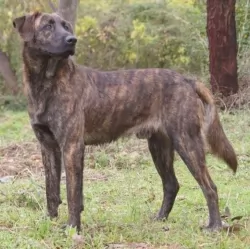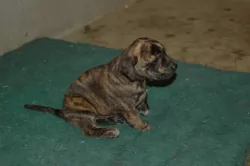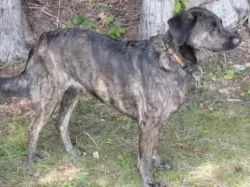 MyDogBreeds
MyDogBreedsTreeing Tennessee Brindle is originated from United States but Southern Hound is originated from United Kingdom. Treeing Tennessee Brindle may grow 10 cm / 3 inches shorter than Southern Hound. Treeing Tennessee Brindle may weigh 18 kg / 39 pounds lesser than Southern Hound. Both Treeing Tennessee Brindle and Southern Hound has almost same life span. Treeing Tennessee Brindle may have less litter size than Southern Hound. Both Treeing Tennessee Brindle and Southern Hound requires Low maintenance.
 There doesn’t seem to be 100% clarity on how the dog came about but it originated in USA. It appears as though it was only since 1995 that records have been maintained through the American Kennel Club's Foundation Stock Service Program.
There doesn’t seem to be 100% clarity on how the dog came about but it originated in USA. It appears as though it was only since 1995 that records have been maintained through the American Kennel Club's Foundation Stock Service Program.
A Reverend Earl Phillips, who was a writer for a hunting magazine became aware of a Brindle Cur with a brown coat and tiger stripes. In fact ‘treeing’ is a type of hunting, where the dog chases an animal into a tree to escape. He heard about the dog’s amazing hunting skills.
In the early 1960s, he later formed The Treeing Tennessee Brindle Breeders Association, designed to protect the breed. It was in 2013 that the dog got foundation stock status with the American Kennel Club, but isn’t registered with the American Kennel Club.
The Southern Hound hails from England and is a breed of dog that existed sometime in the 19th century.
There isn’t much information available as to the time the dog became extinct. Some people believe that other breeds were bred with the dog until the true Southern Hound bloodline no longer existed. It was a breed of scent hound, and had an excellent sense of smell.
Known also as the Old English Hound, it was during the 18th century that the Southern Hound’s popularity waned and other kinds of hounds became more prominent.
While the Southern Hound has been extinct for decades, there is still some of this dog breed found in modern day breed.
It s believed that the Southern Hound has been used in the development of the Beagle and the Bloodhound as you can see the similarities.
 The Treeing Tennessee Brindle is a medium sized, deep chested breed of Cur, descending from the Old Brindle Cur dog.
The Treeing Tennessee Brindle is a medium sized, deep chested breed of Cur, descending from the Old Brindle Cur dog.
These strong dogs have a short, smooth brindle coat that is fairly soft to the touch. The coat's color is a mix of tan, black and a little bit of white.
He stands at between 41 and 61cm in height and weighs between 14 and 23kg both male and female. The Treeing Tennessee Brindle has a loud bark and it is best that this dog lives on a farm or in the suburbs as opposed to living in a small space in the city.
The Treeing Tennessee Brindle is a friendly, social dog and this is why he doesn’t make a particularly good watchdog.
He gets on well with children in the home as well as other dogs, not showing any aggression towards them.
They’re intelligent dogs and it will be a good idea to have them trained and socialized to make them well balanced and well behaved.
The Southern Hound was a large, solidly built, deep chested dog with a square head and a longish muzzle. He stood at between 58-71 cm in height and weighed 25 – 41kg.
The Southern Hound had long, wide floppy ears, much like the Basset Hound of today. The tail was fairly long and curved upright. It was known for its deep melodious voice, much like the Bloodhound we have today.
It had excellent scenting abilities and was used to follow the trail of its prey. The coat of the Southern Hound was short and smooth and it is believed that the most common colors for the coat were white with black or brown markings, making it a tricolor dog.
Used to being on the hunt with other dogs, there is no doubt that the Southern Hound wasn’t aggressive towards other dogs and that he knew how to get along with them. It’s a dog that was dedicated to to the hunt and was bred to work, known for its stamina and endurance.
The dog didn’t possess strong herding or protective instincts and it is thought that it wasn’t kept as a companion dog. Because of the breeds used to develop this dog, it is assumed that it was a non-aggressive, friendly dog.
 This brindle-colored cur dog is brave, intelligent and lively and his temperament allows him to be a good companion for his human family.
This brindle-colored cur dog is brave, intelligent and lively and his temperament allows him to be a good companion for his human family.
Even though they are friendly around strangers, they still make good watchdogs and will alert you to all kinds of visitors to your property. They do best in a home with large grounds and an active family where they can explore and sniff around. At the end of the day, they love to lie contentedly at your feet, a loyal, loving companion.
The Southern Hound is no longer in existence, which is a pity as it seems as though he may have made an excellent pet in modern times.
They were a playful breed, loyal, gentle and affectionate and no doubt made a good watchdog too, although it is thought that his protective instincts weren’t good.
They aren’t dogs recommended for city living, but it seems according to the few records there are of this dog that he could have made a reliable, loving pet to have around.
 The Treeing Tennessee Brindle is a robust, healthy breed. You’re not likely to battle with too many health issues with him.
The Treeing Tennessee Brindle is a robust, healthy breed. You’re not likely to battle with too many health issues with him.
Watch out for ear infections which are more common in floppy eared dogs. Other common dog diseases that you need to know about -
This is a viral disease which is highly contagious and with no known cure. It’s why there is a vaccine against it. Coughing, lethargy, high temperature and loss of appetite with vomiting are symptoms of this disease.
This is another highly contagious respiratory viral infection transmitted between dogs in close proximity to each other, like in kennels for instance.
Symptoms include coughing, sneezing, nasal discharge, breathing difficulties, lethargy and loss of appetite. It’s important to get veterinary assistance as pneumonia could set in.
The Southern Hound had drop ears which would have made him prone to ear infections. This is because unlike dogs with erect ears, air isn’t able to circulate into the ear and the inside of the ear become a breeding place for bacteria.
The dog may have had to deal with Cherry Eye too. This eye problem affects the tear gland in the third eyelid. It needs to be treated so as to avoid long term eye problems. This is also because exposure of the tissue can bring on swelling, inflammation and infection.
 A brush once or twice a week will be sufficient for this dog. Look inside his ears for signs of redness which could indicate an ear infection. Make sure his eyes are still bright and not red and with a pus discharge. Trim his nails too.
A brush once or twice a week will be sufficient for this dog. Look inside his ears for signs of redness which could indicate an ear infection. Make sure his eyes are still bright and not red and with a pus discharge. Trim his nails too.
The Treeing Tennessee Brindle is a high energy dog and he is going o want more than just a walk every day, although he will love that and rely on you for this daily outing.
He will also want ball games and hide and seek games.The breed needs an active owner who will take him on long walks and hikes.
Whenever you opt to give a dog commercially manufactured dog food, you need to check that the dog food is made with high-quality ingredients which are mostly made up of protein or meat.
Certainly a puppy will need protein in his food for proper growth and he will require 4 bowls of food a day. An adult dog will require 2 bowls of food a day.
The type of commercial dog food you buy will depend on the age of your dog as well as his activity levels. If your dog has a known allergy or illness, there are dog foods manufactured with that in mind.
Try and in include some homemade food into his diet. Nothing spicey and exotic as this can cause stomach problems. A good guide is boiled chicken, brown rice and vegetables.
Because this dog was once used as a hunting dog, they were accustomed to large open spaces. He would have required a fair amount of exercise. They would have needed a walk every day if he wasn't involved in a hunt that day.
The Southern Hound had a short coat and in those days he probably would have needed to be brushed once or twice a week.
The Southern Hound would have required top quality food to support his energy. If in that time there has been commercially manufactured food, it would have had to be the better quality ones. Today if you were feeding the Southern Hound you would check out the ingredients on the packaging and go for the dog foods with wholesome, natural ingredients in them.
No doubt the owners of these dogs provided their dogs with raw and cooked meat. If you had a Southern Hound today you would try to include some home-made food for him which would be simply mixed into the dry kibble twice a week. Boiled chicken, brown rice or pasta and spinach, sweet potatoes and carrots is super nutritious.
The Southern Hound would have required a constant supply of fresh, cool water within his reach.